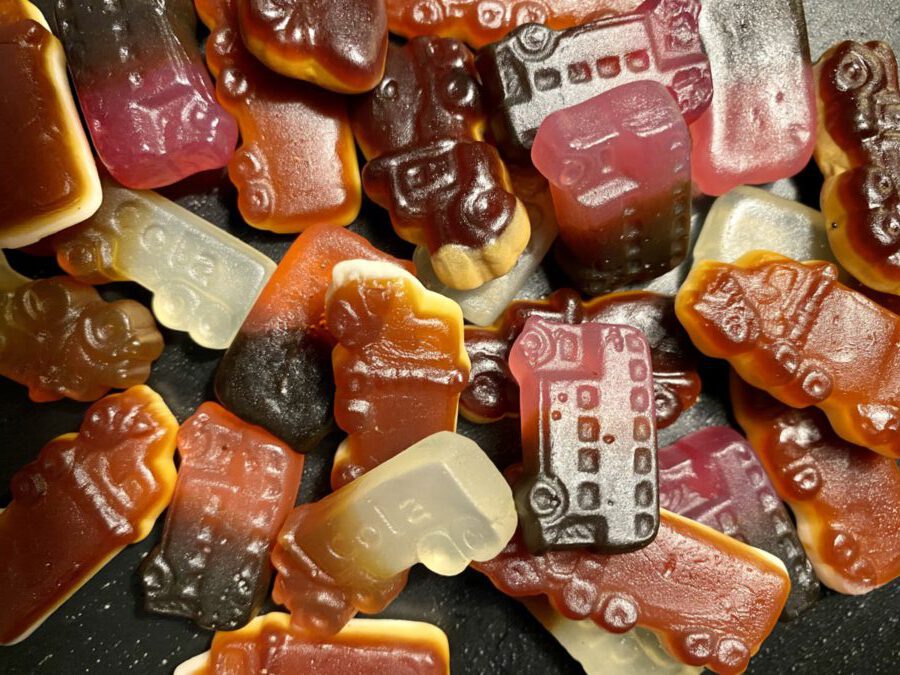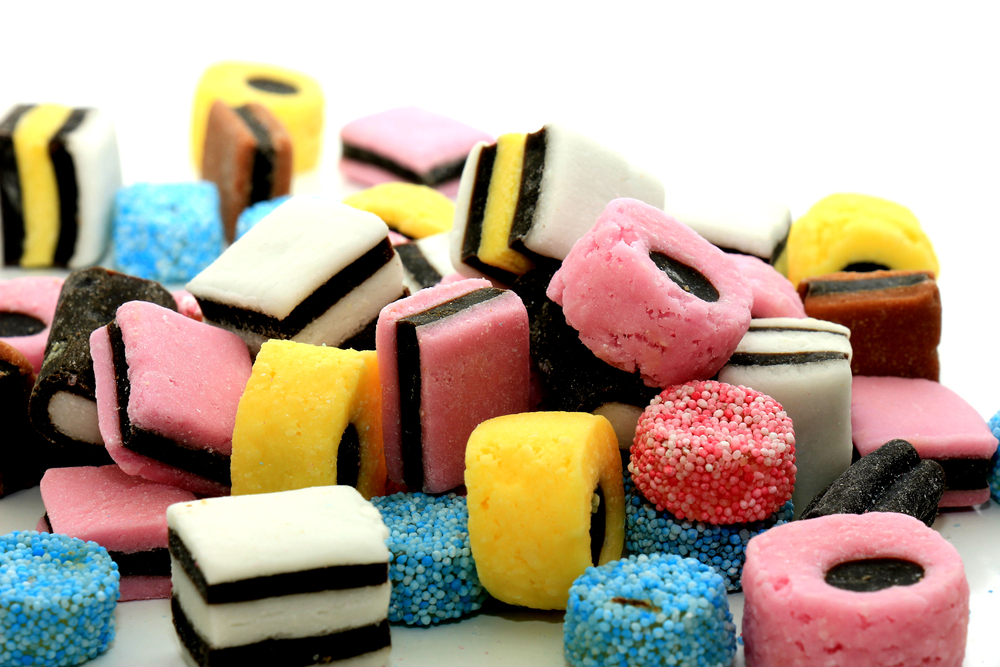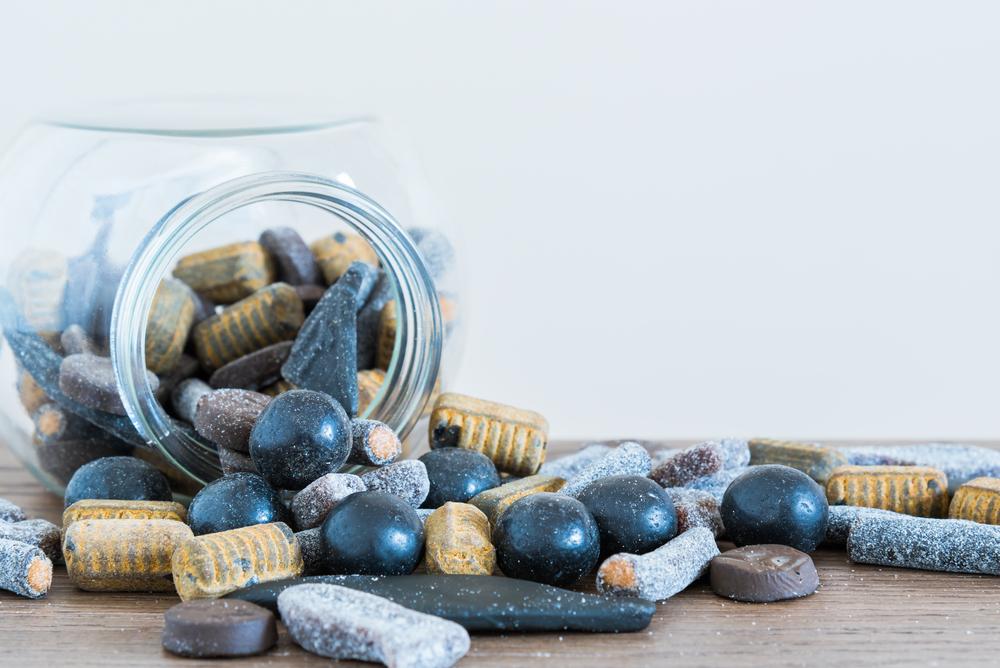The infamous Dutch drop: some salivate at the thought of it, while others wince and pucker. Dutchies love it, but it can be a real shock to the system for those not accustomed.
Opinions of drop tend to be black and white, but the liquorice itself comes in all colours and flavours. Many are even delicious, fruity, and sweet, so it’s worth doing a bit of experimenting. But how is one to differentiate the sweet from the salty, the delight from the anguish?
That’s what we’re about to find out, so use this guide to courageously ease into the weird world of Dutch drop. 🍬
So what makes drop unique?
Dutch drop is essentially black liquorice, though it’s done quite a bit of shape-shifting over the years. What makes it so interesting is its immense variety — it can be sweet and chewy, hard and burning, a delicious treat, or an assault (“a-salt” 😂 ) on your palate.
READ MORE | 7 Dutch foods you need to try before you die
The salty liquorice you probably associate with the Dutch is flavoured with a very special ingredient called salmiak. It’s ammonium chloride (yum). The chemical adds bitterness and astringency to the candy and is harmless when used in a small, food-grade amount.
Now, this salmiak is the definition of “an acquired taste.” Plenty of people who love liquorice may never come around to it. In the absence of ammonium chloride, though, the traditional drop is good old-fashioned black liquorice. Nowadays, that liquorice is often mixed with other milder, fruitier flavours and appeals to a wider audience.
A brief history
The Dutch (along with other Northern European countries) long ago acquired the unique taste for salmiak liquorice. The candy, and salmiak in general, used to be sold in pharmacies as cough medicine. Salmiak pastilles, which have a higher concentration of ammonium chloride, are still considered a traditional medicine to assist in loosening the airways.
READ MORE | The Dutch food dream: 13 unmissable dishes in the Netherlands
Liquorice is the root of Glycyrrhiza glabra, which has been used medicinally for over 4,000 years. Its soothing properties and natural sweetness make it a perfect accomplice for the abrasive salmiak. In the 13th century, salmiak drops became the go-to remedy for a sore throat and many other minor ailments (like the paracetamol of yore).
For reasons incomprehensible to the rest of the world, people got hooked on the sharp chemical flavour of the medicine. By the 1930s, salmiak liquorice had become a regular Dutch household treat. Even today, Dutch people will suck on drop when they have a sore throat.
Drop categories
Dutch drop comes in all shapes and sizes. There’s a vast range of flavours and textures, so it’s important to know what you’re getting. Most drop fit into four categories: soft and sweet, hard and sweet, soft and salty, and hard and salty.
#Dutch junk food night! Big flavours! Including Dubbel Zoute Drop (double salted licorice, stroopwafel (waffle cookies), paprika chips (which I am STOKED to try), and assorted nasty (wonderful) candies. #dubbelzout #dutchlicorice pic.twitter.com/idOFaTOOjC
— Donald Fraser (@ptbo_skeptic) March 25, 2018
In Dutch, zout (salt) and zoet (sweet) might sound similar coming off the tongue, but there’s an alarming difference on the tongue. To spare you the pain of having to learn the hard way, here are some of the more popular varieties you’re likely to come across:
Soft and sweet
These are the furthest escape from the traditional drop, making them the most palatable to those who don’t fancy the salty black stuff.
READ MORE | Dutch Quirk #119: Make all their foreign friends try drop
Autodrop
Cars and trucks. These are excellent gateways to drop. The mix often contains some pieces of just fruit or cola-flavoured candy.

Apekoppen
The so-called Monkey heads are soft and sweet, a rather far and welcome departure from the salty original. 🙈
my favorite candy is called apekoppen and its banana and black licorice and it looks like a monke pic.twitter.com/jzdW98Vpc1
— Sofía♈️🥀 (@grimfeminine) January 13, 2023
Fruit Duos
These are 50% wine gum, 50% liquorice, and 100% enjoyable. They can bridge the gap between the comfort zone and adventure for the liquorice-leary.
Drop Revolver
Shaped like a gun barrel, these are less dangerous than their look might lead you to believe.
Kritzli
This cylindrical liquorice usually has a soft fruity filling, though sometimes you’ll find caramel, mint, or other varieties.
Allsorts
Also known as Engelse drop (English liquorice), these are a mix of shapes with pastels. They have a slightly acquired texture but are nonetheless delicious.

Hard and sweet
These sweet treats will keep you chewing. They might be hard on the jaw, but they’re much easier on the palate, that is, if you like the flavour of liquorice.
Kleurendrop
Small, multi-coloured, candy-coated drop. Crispy outside, chewy inside, entirely painless.
Honingdrop
Honey-flavoured, shaped like a beehive. Less of a liquorice flavour, but still among the classics.
Katjes
Hard, chewy black cats — a super classic toothsome treat.
Menthol Kruisdrop
Square-shaped with a first-aid sign. Quite medicinal tasting but still passes as candy.
Schoolkrijt
Black or white, and it looks like chalk — hence the name. Nice and chewy, really somewhere between soft and hard.
Dang… made the mistake of buying Schoolkrijt again telling myself I'll just eat 2 or 3… Maaan now i can't stop 🤤😂 again 😟 pic.twitter.com/gmbUKdRj1w
— George West (@GeorgeWest3112) March 5, 2022
Soft and salty
Trepidation is only natural in this category. The plus side to the softer salmiak varieties is that they require less chewing so you can get the experience over with more quickly.
Griotten
Light brown salty-sweet blocks. They may look like sugar cubes but don’t be fooled.
TV Pastilles
These old-timey pill-shaped salmiak tablets look more like medicine, and they taste like it too. They should probably require a prescription.
Zakkenrollers
Zakkenrollers translates to “pickpockets” in English. A bitter assortment of keys, watches, cell phones, and more. It’s salmiak liquorice with an extra salt coating. About as aggressive as an actual hold-up.
Salmiakrondo
A liquorice ball with chewy salmiak inside. Fantastic texture but terribly burney.

Hard and salty
It’s hard work eating Dutch drop in its most traditional hard and salty form. Not only does it burn the mouth, but it also exhausts the jaw — that is, if you can manage not to spit it out (good luck 😬).
Dubbel zoute
The most pungent of all, these are most commonly coin or diamond-shaped. They’re often stamped with a DZ, so you can’t say they didn’t warn you.
The Netherlands. Nothing beats dubbel zoute drop (or “Dutch licorice from hell” as one expat colleague referred to it). pic.twitter.com/tPCRhiwv3z
— Olivier Slabbers @**@******on.social 🇺🇦 (@Oli4K) February 10, 2022
Oceaandrop
Various ocean creatures like seashells and seahorses. They might look friendly, but they’re as salty as the sea.
Tikkels
Hard on the outside but soft inside (also available in non-salmiak varieties). They’re like weird little jelly beans. They’re nobody’s favourite, but everybody’s familiar with them.
Mintnopjes
Minty candy coating on the outside with a sharp, chewy salmiak centre. Looking festive in red and white, like an ill-intentioned holiday prank.
Laurierdrop
Hard and salty with menthol for an additional level of discomfort. Usually, coin or rectangular-shaped and imprinted with a Laurier leaf.
So, now you can explore the world of drop fully informed. Don’t say we didn’t warn you!
Have you tried Dutch drop? Do you fall on the love or hate side of the spectrum? Tell us in the comments below!





this lady is of her rocker and knows nothing about licorice or drop
Just went for a Dutch candy run today!!! Griotten, TV Pastilles, Double Zout and Zoet powder have been my lifelong favs!!! If your not a Dutch candy lover, good!!! More for us that are!!!
My dad is Dutch and I’ve been snacking on drop since I was a young kid at my oma and opa’s apartment. I love drop, however have almost lost close friends convincing them to try a DZ (double zout) without a fair heads up. Between chocolate and drop I would easily choose drop, the best treat. Nice article!
I first tried DROP after getting off of a tramcar at a market in Amsterdam. There was a barrow with all this black shaped stuff. I asked the seller what is all this stuff? He replied DROP. Luckily he spoke English. He explained it’s Dutch Licorice but the Dutch like theirs SALTY. Luckily he gave me a couple of pieces to taste. The first piece was discusting but I persevered & the 2nd piece wasn’t as bad (in fact it was kinda interesting) so I bought a packet of Drop. The 3rd piece was nice & by the 4th piece I was hooked & adore Drop to this day. If you like the black midget gems you’ll grow to love Dutch DROP Licorice. I do
Eh? No discussion of fisherman’s friend?
As a Swede (THE country of licorice candy), I have to say NL does really good licorice candy and other candy. It may partly be because one of the biggest (Swedish) candy companies – Cloetta – owns Red Band any many more. But then again Venco is almost as old as Cloetta.
I had this when I was a kid but can’t find it anywhere, help?
It was something my Oma put into a bottle and we would shake it and suck off the licorice foam. Soooo good!